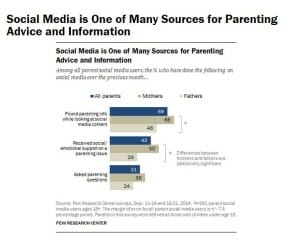It’s not only youth that love the Internet, earlier this year PEW Research shared that 52% of adults online are engaged in social media with Facebook as the most popular.
We have heard the rumors that teens are finding other social media outlets, such as Snapchat or Instagram, since parents are in love with Facebook, however the youth are still mingling on Facebook too since there are functionalities that Facebook still offers that the others simply don’t.
Social media as a whole sometimes can get get a bad rap. Whether we are talking about cyberbullying, using Twitter to disparage someone, posting an unflattering photo of a person as a joke (which isn’t funny) on Instagram, using forums as venting machines that get out of control with vile language and cyber-bullets that harm others, revenge porn, online shaming, and more – but let’s look at how parents are using social media for learning from each other!
According to the latest PEW Research, Parents and Social Media, parents are turning to social media for information on parenting and social support on raising their family.
As I recently wrote in my Huffington Post article, How Social Media Transcends Grief, I was simply amazed at the social support I had received after the death of not only my grandmother, but of my pet. Let’s keep in mind, digital friends are people (usually) you haven’t meet in real life, you are trusting through a screen. It’s your gut that give you the intuition to trust their advice – their support – their virtual friendship. As I pointed in my article, sometimes these people are closer to you than your own blood relatives.
In the research, parents – as well as non-parents, like many platforms of social media, but Facebook leads the pack by a fairly large percentage. 81% of moms and 66% of dads prefer Facebook, while 70% of non-parents overall use this platform.
Sharing and over-sharing
Most parents have not felt uneasy about the content posted about their children by other family members or caregivers on social media.
Digital citizenship. We frequently speak about over-sharing and pausing before we post, especially if we are about to post a picture or content of someone else. I am assuming that the people that were surveyed for this study must have trusting friends/relatives that have posted images of their children or family members to have such low percentages.
- 12% of all parents of children under 18 say they have ever felt uncomfortable about something posted about their child on social media by a spouse, family member or friend. Fully 88% say they have not felt this way.
- 11% of all parents have ever asked for content about their child posted by a family member, caregiver or friend to be removed from social media.
Social Media: The Mom and Dad Community
I relate this part of the survery to the same cliché of women will ask for directions, as men will continue to drive in circles. However let’s give dad some credit, they are definitely here and making a strong effort to be good parents. Keep in mind, this is not all parents – it’s only this study.
Social media is broadly viewed as a source of useful information and as one parenting tool among a collection of options. Mothers use it as a parenting resource slightly more often than fathers.
- 79% of parents who use social media agree that they get useful information via their networks.
- 59% of social-media-using parents indicate that they have come across useful information specifically about parenting in the last 30 days while looking at other social media content.
- 42% of these parents have received social or emotional support from their online networks about a parenting issue in the last 30 days.
- 31% of parents who use social media have posed parenting questions to their online networks in the last 30 days. Mothers and fathers are equally likely to do so.
The nurturing social media keystrokes: The Mother’s Touch
Mothers are heavily engaged on social media, both giving and receiving a high level of support via their networks.
Maybe mom is more nurturing, maybe she has more time to be on social media, she knows how to respond to difficult news better than a dad – either way, mothers ranked higher when it came to giving and receiving good news on social media.
Overall, the results show that parents do care about other parents and support each other.
- 81% of parents who use social media try to respond to good news others share in their networks.
- 74% of parents who use social media get support from their friends there.
- 71% of all parents on social media try to respond if they know the answer to a question posed by someone in their online network.
- 58% of parents who use social media try to respond when a friend or acquaintance shares bad news online.
It’s not all negative news for fathers. They are engaging too, just not as frequently as mom. We often speak about people spending a lot of time online, maybe men choose to spend their time in other cyberspaces. It is not right or wrong, it is about choices. We can’t judge people on what or where they like to spend their time online (with the exception of illegal spaces).
Not everyone is looking on social media for parenting support or advice. It seems that many are – and I believe that is a great thing! It doesn’t replace medical doctors or therapists, but it certainly gives parents a sense of not being alone or a feeling of helplessness.
There is nothing like having a mom or a dad or any guardian say to you – “hey, I have been there – when my child did that, this is what I did to help resolve it….” It’s truly not any different than when you go on to a DIY site and ask how to get a stain of a shirt – and you get a hundred responses.
Social media has so many ways to support each other, it’s a shame that trolls and others find ways to use for hurtful ways. As long as we keep the positive moving forward – and rolling over top of the negative, hopefully someday those trolls will get tired (though I sort of doubt it). There is always hope.
Keep that parenting advice coming on social media. You never know when you will be helping someone. Especially with digital parenting too. Everyone today can use help keeping up with their kids online. Parents today don’t have it easy – so you need everyone to help each other.


